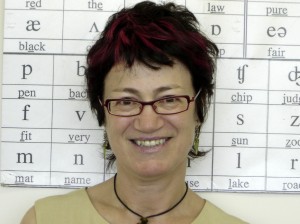
The Director of the Pronunciation Clinic
The Director
Dr Yvonne Perczuk
Qualifications
- PhD. Languages, University of Melbourne
- M.A. Linguistics, (M.A.K. Halliday University Medal), University of Sydney
- TESOL certificate (Award A ), University of New South Wales
Yvonne Perczuk has been a specialist in the design and delivery of university level courses, in English pronunciation and communication, since 1993.
The Pronunciation Clinic has delivered personalised pronunciation training for a wide range of organisations, including most recently:
- Toshiba, Australia
- Commonwealth Bank
- Insurance Australia Limited (IAG)
- UTS School of Finance and Economics
- Private clients who works in a range of fields, including finance, education, medicine and law
Program Design
Her courses and training videos are used widely at all levels at the University of New South Wales Institute of Languages (UNSWIL);
• she has designed university level pronunciation courses at all levels, as well as specialist courses geared to the particular needs of business professionals;
• has designed and directed teacher-training videos on pronunciation techniques.
Teaching and cross-cultural experience
In 25 years of teaching English to university students from all over the world, Yvonne has gained experience and a deep understanding of cross-cultural issues.
Yvonne
• has taught and supervised general English and special purpose classes (academic and business)
• has conducted teacher-training courses at the university
• holds a Doctorate in Languages and a Masters in Linguistics and completed her doctorate on a scholarship in Europe, travelling widely to extend her knowledge of other cultures
• has taught Language and Literature at the University of Melbourne.
Presentation Skills and Public Speaking
• Her training video, ‘Presentation Skills’, is used across all departments at the University of New South Wales, Institute of Languages (UNSWIL).
• Courses taken in voice production and drama, together with her experience in the performing arts, have been invaluable in her delivery of training in all aspects of public speaking.
Publications
‘The Music and Dance of English: Teaching Intonation and Body Language’
ELICOS Conference- Proceedings, Cairns (1993)
‘Sex, Drugs and Videotape, or running a Student Video Project’
ELICOS Conference- Proceedings, Brisbane (1997)
Pronunciation and Prejudice
It is the connection between pronunciation and prejudice and cultural stereotyping which first drew Yvonne to the field of pronunciation and has made her a passionate advocate of the need for pronunciation training.
Research shows that people often make judgments about the personality and attitudes of non-native speakers, based on their pronunciation.
How often have we all heard unjustified negative stereotyping, like:
‘The French are arrogant’, ‘Russians are pushy’, ‘Asians are inscrutable’.
While partly due to intolerance of cultural differences, this stereotyping owes a lot to misunderstandings due to poor pronunciation.
Each language has its own very special rhythm and pitch patterns, and when speakers of one language transfer the speech patterns of their native tongue to a second language, they can unknowingly deliver the wrong message. For example, when certain non-native speakers transfer the choppier, flatter delivery of their language to English, the unfamiliar speech patterns can sound unenthusiastic or abrupt and even unfriendly to the native English listener’s ear. The non-native speaker is then automatically labelled as ‘impolite’ or ‘unfriendly’.
“My goal is to open my students’ ears to the music of English and to develop their awareness of the hidden messages in the natural patterns of spoken English. This helps them understand the puzzling, often negative responses to their own speech.
“This new awareness and the systematic program of speech pattern practice, enables students to become effective communicators and active managers of their own pronunciation.”
(Interview with Dr Yvonne Perczuk, in Kulisy-Express Wieczorny (2002), a Sydney based, Polish ethnic newspaper)
